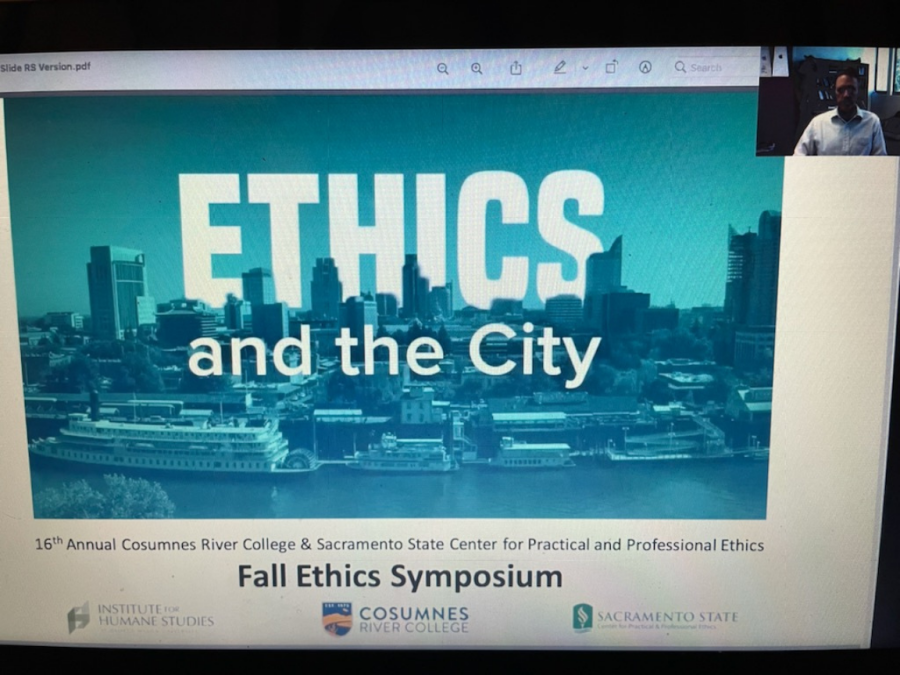16th Annual Fall Ethics Symposium focuses on ethics and the city
The 16th Annual Fall Ethics Symposium will be having multiple events this year. The first event was held on Sept. 29, and this year’s symposium will focus on ethics and the city.
The 16th Annual Ethics Symposium: Ethics and the City is hosting multiple events this year. The first event was held on Sept. 29 from 1 to 2:30 p.m.
The Ethics Symposium is a co-production of Cosumnes River College and the Sacramento State Center for Practical and Professional Ethics.
Richard Schubert, the executive director of the Fall Ethics Symposium, has been involved with the symposium since its creation in 2005.
Schubert said this year’s symposium is dedicated to looking into ethics, cities, housing, gentrification, the gig economy and equity.
“This year, we’re looking at ethics and the city,” Schubert said. “Much of the program is focused on issues around housing and equity, but we’re also looking at some other issues at the intersection of ethics and the urban.”
Schubert said the symposium brings in national and international scholars to discuss these topics and issues in order to provide students with an academic conference experience.
“They’re an opportunity for our entire academic community, especially our students, to enjoy scholarly and academic exchange outside the classroom,” Schubert said.
The Institute for Humane Studies has been sponsoring the Ethics Symposium since 2014.
Schubert said the events will be held over Zoom webinars with a Q&A opportunity for the audience members once the speaker and formal respondents are finished.
Honors students participate in the event as formal respondents for the speakers. Once the speakers are done with their piece, honors students will respond with comments, questions and/or challenges to the speaker’s argument.
The Honors program at CRC provides enhanced general education study opportunities for students. Participation in the program also gives students access to enhanced career and academic advice, supports transfer (to universities) and provides scholarship opportunities to select colleges and universities.
Schubert said the ethics symposium is an event that honors students are encouraged to participate not only because of the academic opportunity, but because it will help them stand out for university transfer applications.
Once the honors students are finished, the Q&A opportunity is opened up for audience members, and mediators of the webinar will ask questions from the Q&A chat.
Ilea Farrel, a 19-year-old English literature major, is an honors student and formal respondent for this year’s ethics symposium.
Farrel said she had participated in the ethics symposium in the previous year.
“I got invited last year to participate in the symposium and I was a student respondent last year too,” Farrel said. “It was really cool to be able to see different professors talk about things that they’re passionate about.”
Since participating, Farrel said her favorite speaker was Bryan Caplan, an economics professor at George Mason University in Virginia, who discussed economics and higher education.
“I listened to another professor and he was talking about economics and how he didn’t feel as if people should be forced to go into higher education and go to college right after high school,” Farrel said.
She also said she enjoyed Caplan the most because she related to the subject he was discussing.
This year, Farrel said she was most excited to hear Paola Suarez, an economics professor at Seton Hall University.
“I’m most excited for the event I’m participating in because I got to pick which one I could respond to,” Farrel said. “That one is Paola Suarez, she’s talking about women and the gig economy.”
The first event of the Ethics Symposium was dedicated to Cities and the Possibility of Inclusive Freedom. Ryan Muldoon, an associate professor of philosophy at the University of Buffalo in New York, discussed the different aspects of freedom (and the restrictions) between living in the rural, suburbia, and the urban (cities).
“This conception of freedom focuses on the ways in which you can expand your options rather than protect it from contraction,” Muldoon said. “If we focus on this positive aspect of freedom, I think we can try to spend time thinking about what creates additional options for ourselves, and I think the answer is that other people do that. Cities make us richer because of the other people in them.”
The last two events will be held on Tuesday and Wednesday from 10:30 a.m. to 12 p.m.
The events can be found on Sac States’ Center for Practical and Professional Ethics website.
https://www.csus.edu/center/practical-professional-ethics/spotlights/spotlight.html

